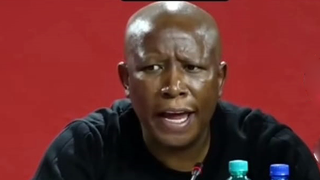Julius Malema, the leader of the Economic Freedom Fighters (EFF) in South Africa, has raised concerns about a potential power grid collapse in the country. Malema alleges that the Federal Bureau of Investigation (FBI) has issued a warning based on information from a source present at a meeting between the FBI and the South African Secret Service. While Eskom, the national power utility, denies the risk of a complete blackout and assures the public of contingency plans, Malema’s comments have been criticized as exaggerated and irresponsible.
According to Julius Malema, the FBI has cautioned about an imminent power grid collapse in South Africa within the next two weeks. These claims are based on information from a source who purportedly attended a meeting between the FBI and the South African Secret Service. Malema’s statement also includes a call for the return of former Eskom executives, Brian Molefe and Matshela Koko, whom he believes were unjustly targeted for alleged state capture.
Eskom, on the other hand, has firmly denied the existence of an immediate risk of a complete blackout. The power utility acknowledges the possibility of challenges during the upcoming winter season, including frequent load shedding. However, Eskom asserts that it has implemented contingency plans to manage any emergencies that may arise. These plans are aimed at minimizing disruptions and maintaining a stable power supply to essential services and the general public.
Energy analyst Chris Yelland has weighed in on the situation, stating that while a complete blackout cannot be entirely ruled out, the chances are relatively low. Yelland emphasizes that Eskom requires increased funding, maintenance, organizational changes, and enhanced oversight to improve its efficiency and reliability. He urges South Africans to be mindful of their energy consumption and consider transitioning to greener energy sources to alleviate the strain on the power grid.
Eskom plays a vital role in South Africa’s economy and daily life. The national power utility supplies electricity to residential, commercial, and industrial sectors, making any disruptions or collapse a significant concern. A complete blackout would have severe consequences for the functioning of hospitals, schools, businesses, and households across the country.
Eskom’s operational challenges, including aging infrastructure and insufficient capacity, highlight the need for urgent action. To enhance the stability of the power grid and mitigate the risk of potential blackouts, Eskom requires substantial investments, technological upgrades, and maintenance. Additionally, a shift toward cleaner and renewable energy sources can reduce the strain on the grid and contribute to a more sustainable and resilient energy sector.
In the face of potential energy shortages, South Africans have a collective responsibility to conserve energy. Simple actions such as turning off lights when not in use, using energy-efficient appliances, and optimizing heating and cooling systems can significantly reduce overall electricity demand. Furthermore, individuals and businesses can explore alternative energy solutions, such as solar power, to supplement their electricity needs and reduce reliance on the grid.
The allegations made by Julius Malema regarding a possible power grid collapse in South Africa have sparked a significant debate. While Eskom denies the risk of a complete blackout and assures the public of contingency plans, there is acknowledgment of potential challenges during the winter season, including frequent load shedding.
Energy analyst Chris Yelland emphasizes the need for increased funding, maintenance, and oversight to improve Eskom’s efficiency and reliability. Ultimately, a combination of responsible energy consumption, investment in infrastructure, and a transition to cleaner energy sources.

